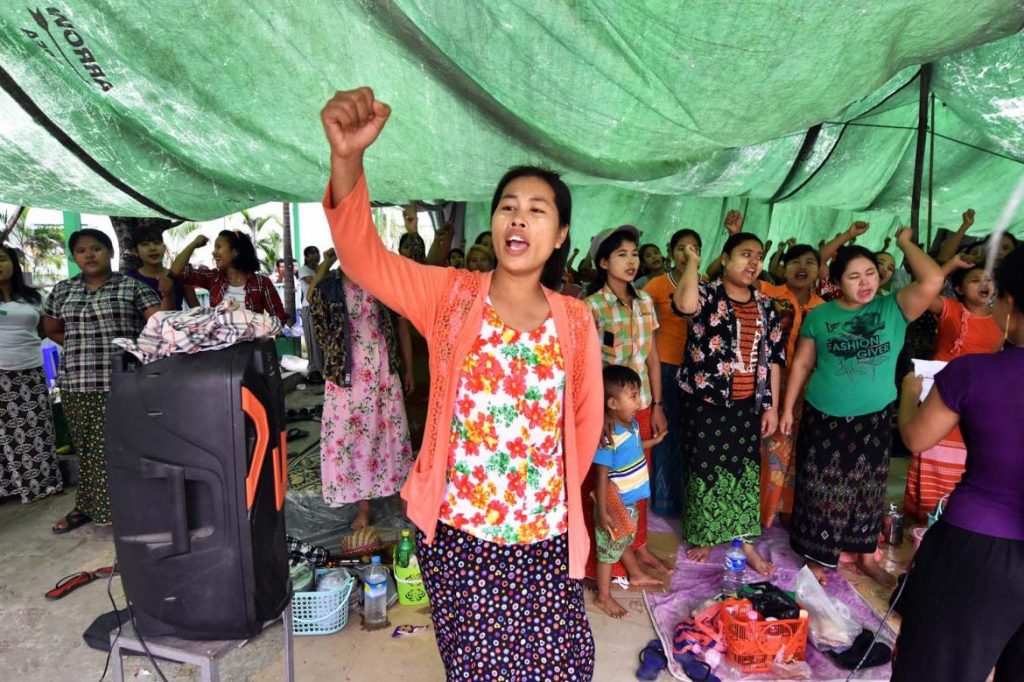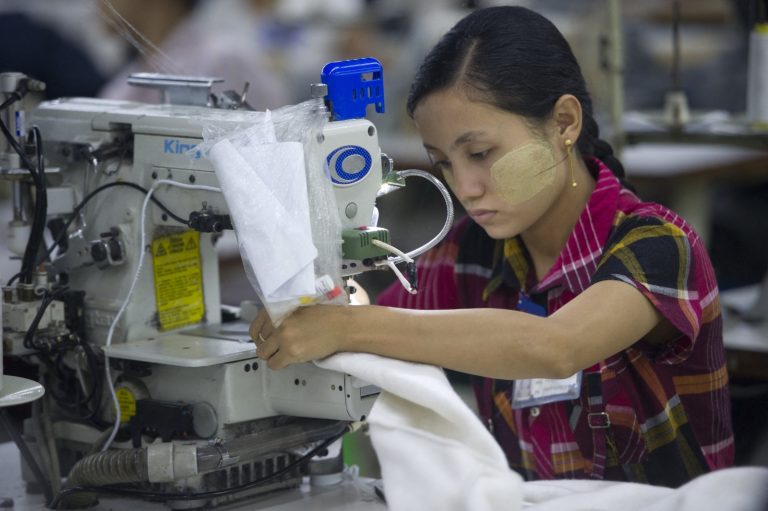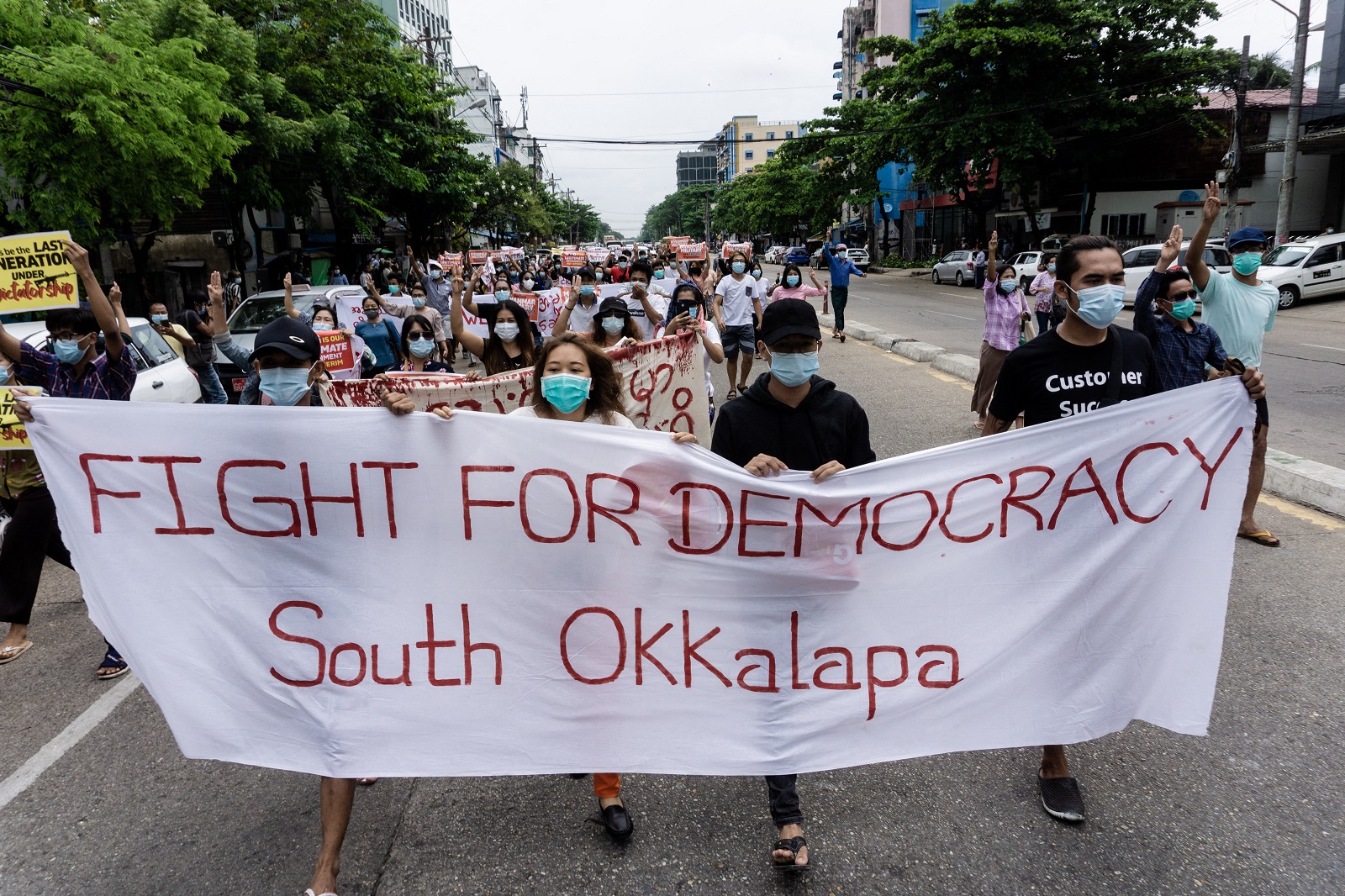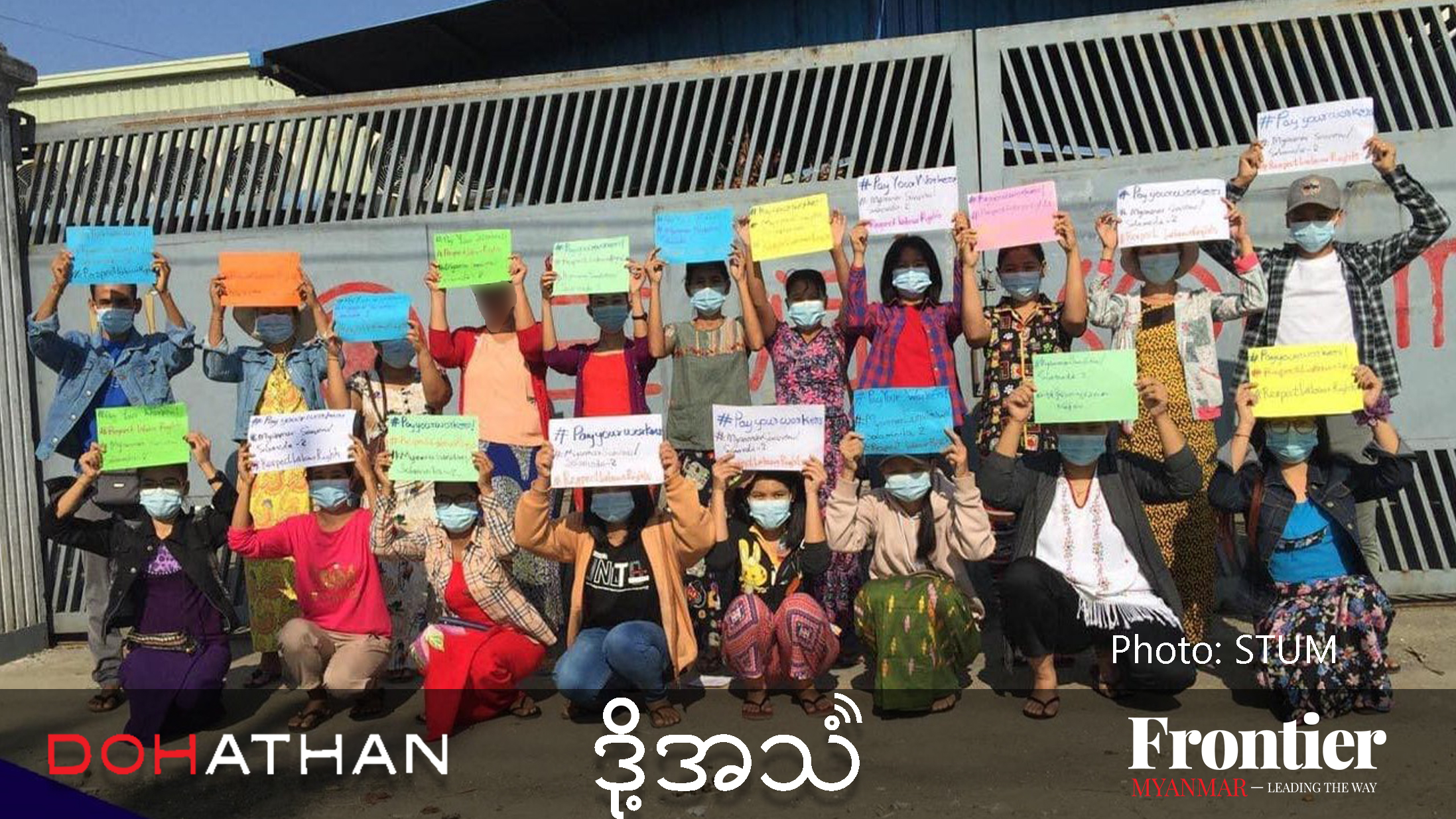As lawmakers consider changes to labour laws, workers go on strike for a second time in six months at a Taiwanese-owned shoe factory in South Dagon.
By HEIN KO SOE | FRONTIER
THE WORKERS sit in front of the entrance to the Emerald Land shoe factory in the South Dagon Industrial Zone in mid-December. On the entrance to the door, they’ve put up a piece of red vinyl with the words “Kyauk Sein Shoe Factory Strike”.
A group of them chant a slogan, “Aloke thamar, aloke thamar, kon htoke loke hmu bon swan arr… phi hnate hmu dawt khan ya deh hae…”
The slogan explains the importance of workers to the operation of the factory and the profits of the owner.
About 300 of the factory’s 1,300 workers are striking because of what they say is the Taiwanese owner’s reluctance to pay them an annual bonus or grant them their leave entitlements. They have also accused the owner of discriminating against union leaders.
Support more independent journalism like this. Sign up to be a Frontier member.
While the workers stage their sit-in, the labour leaders, activists and representatives of the employer are negotiating to end the strike at the township General Administration Department office.
Five days later, the strike is over. The decisive moment comes when the Taiwanese owner warns negotiators that if they don’t end the strike he’ll shut down the factory. The strike has already cost a significant amount of money, he warns.
“We didn’t get our demands in full,” said Ma Cho Cho, secretary of the factory’s labour union. “We had little choice but to accept though because if they close the factory we will lose our jobs.”
Still, the workers have extracted some concessions. One of their main complaints is that, apparently because the owner doesn’t like unions, the factory’s managers and supervisors discriminate against union leaders when they assign overtime shifts. The shifts are important for a worker’s pay packet: the minimum wage is set at K4,800 for an eight-hour day, and every hour above that is paid at K1,200.
Cho Cho said the owner had agreed not to treat union leaders differently. He’d also promised to pay an experience bonus and allow workers to sign an employment contract, and conceded on some other demands.
Labour leaders are cautiously optimistic it will result in positive change. Their caution comes from their experience last year, when they staged a strike for essentially the same demands. Although they reached an agreement, they say the employer failed to adhere to it.
“Right now we’ve got an agreement again and we’ll have to watch whether it’s applied this time. If not, we will strike again,” said Cho Cho.
Mr Chan, the general production manager at the factory, insisted that the company was following all Myanmar laws, including its labour regulations. He said the disgruntled workers should have tried to negotiate before going on strike.
“They didn’t propose anything about what they wanted,” said Chan, who is also a shareholder in the company. “If they did it we could negotiate for everything.”
He was also upset at what he said was a lack of support from the Myanmar government and Chinese embassy to resolve the dispute.
The negotiations were overseen by Yangon Region lawmaker U Nyi Nyi (National League for Democracy, South Dagon-2) together with township labour, police, immigration and GAD officers.
Nyi Nyi said the deal represented a significant achievement, particularly given the mistrust on both sides.
He refused to assign blame for the disruption, saying that Myanmar workers needed to improve their skills and employers needed to pay a suitable salary and bonuses.
However, he noted that being able to resolve disputes amicably was important for attracting further investment to the sector, which has been one of the bright spots of the economy under the NLD government.
The manufacturing sector has attracted billions of dollars of investment in recent years, much of it towards producing garments. The sector accounted for 31 percent of the $5.718 billion invested in 2017-18, and 40 percent of $1.765 billion from April 1 to September 30, 2018.
Demand from the European Union has helped to make garments one of Myanmar’s top export items and the sector employs up to 500,000 people.
U Naw Aung, vice chair of the Myanmar Industry and Craft Federation, said that low wages were a factor in attracting manufacturers but it was important to ensure that the rights of workers were protected.
“We have to look at both sides very carefully and make the right decision for everyone in Myanmar,” he said. “But mostly we should take care of our workers. The government should help them to upgrade their skills and to protect their rights through good labour laws.”
One statute being considered for amendment is the Settlement of Labour Disputes Law, which establishes labour tribunals to resolve complaints. The NLD government has proposed amending the way members are selected for arbitration bodies, and also to increase the penalties for those who refuse to comply with a ruling.
As Frontier reported in August 2018, business groups such as the Union of Myanmar Federation of Chambers of Commerce and Industry were furious about a move to introduce jail terms for violations of the law, while some lawmakers and trade union leaders had said it was the only way to ensure compliance.
The proposed changes have divided the legislature, with the Pyithu Hluttaw (lower house) reluctant to put prison terms in the law and the Amyotha Hluttaw (upper house) pushing for stronger penalties.
The bill has been transferred to the Pyidaungsu Hluttaw, where both lower and upper house lawmakers will soon vote to resolve the impasse.
“We will have to review and vote on the penalties, but it’s not clear when,” said U Nay Myo Tun (NLD, Htantabin). “I think that smaller penalties will be the best for investors and workers.”







